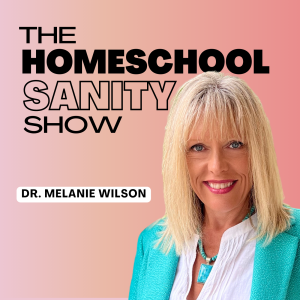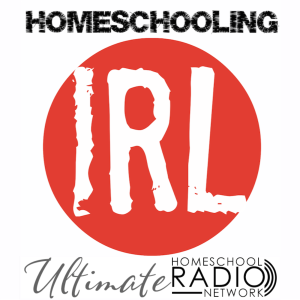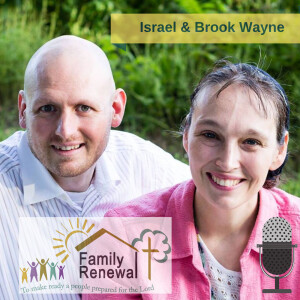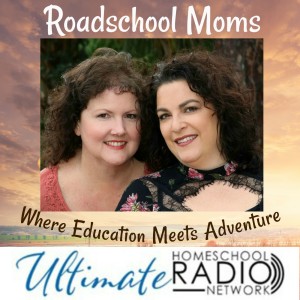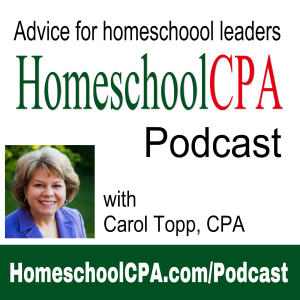

Vintage Homeschool Moms
https://ultimateradioshow.com/category/vintage-homeschool-moms/feed/Episode List

Homeschool Pitfalls: Summer Replay
Homeschool Pitfalls and Help ~ Episode 486 Homeschooling is the right choice, but how do you avoid the homeschool pitfalls that will sabotage your success? In this podcast, veteran homeschool mom Felice Gerwitz shares her thirty-two years of experience with you! Visit the Media Angels website for books, and bundles, especially the self-paced set, “How-to-Homeschool Blueprint.” Did you know that I was hesitant to try homeschooling? When I heard a friend mention her hopes of homeschooling, I talked her out of it! This friend was overwhelmed with her four children, didn’t have a set bedtime, and walked around sleep deprived. I explained that homeschooling took some discipline and that having a parent who was awake and attentive was important! When I began homeschooling some time after, this friend was upset with me! And, rightly so. Your decision to homeschool should be your own, and being persuaded by someone, even someone well-meaning, is not a good thing! Today homeschooling is the best option for your children. You know the state of the school system. It was bad in the past; today, it is worse. Parental rights are called into question. What the heck is going on in our world? When I began homeschooling my son while my daughter was in preschool, I looked at it as a way to help my struggling learner. It was a short-term goal. In other words, I was “trying” homeschooling without thinking of making it past six months. This was in 1986-87, and I never looked back. It became a lifestyle for us, and I built relationships with my children that are strong to this day, even as they are adults. One of the fallacies is making your homeschool ideal or identical to the public or private school. Having said this, there is always an exception to the rule. My sister-in-law homeschooled her two grandkids for a year using the same books as the school because they planned on reintegrating the children into the school system. In this case, it was a good idea, and she was not only highly successful, but she was also able to raise their test scores with the one-on-one attention she gave the girls. It is not fun; all fun and games. A good friend of mine used to say homeschooling is not fun, yet she homeschooled her boys K-12, and they not only learned several foreign languages but were proficient in fencing. How is that not fun? I am going to go through a list of pitfalls in two parts. The first deals with hearsay about homeschooling, and the second is in regard to the act of homeschooling. Please join our Facebook group if you have questions about homeschooling or want to connect. Homeschool Podcast Network Family Homeschool Pitfalls – Combatting the Lies: You do not have enough time. You don’t have an education degree. You work full-time. It is too restrictive. You have to recreate the school at home (use all the same books) Your kids won’t get into a good college. You won’t have time for yourself, and you won’t have a break from your kids. People who homeschool are strange. Your home is too small, and there is no room. You don’t have money to homeschool. Homeschool Pitfalls — Challenges Lack of vision or goal Lack of organization Unruly children No routine Failure to check the schoolwork Uncompleted assignments Unsocialized kids Unable to play sports Lack of knowledge (parent) Unable to teach Homeschooling is what you make it. If your children are unruly, the focus needs to be getting the kids under control. Teaching cause and effect is amazingly successful. I have several podcasts in a collection I call “Just For Kids” (search for that term, and you will find them). These are geared toward children, and they are highly effective. Kids want to be heard and appreciated, just like us! Listen to their needs and focus on the entire child, not just academics. I know you can do it, and don’t forget to join our Facebook group – Homeschool Podcast Network Family on Facebook or share your concerns in this post on the website. The post Homeschool Pitfalls: Summer Replay appeared first on Ultimate Homeschool Podcast Network.

Fall Learning Starts Now
Fall Learning Starts Now ~ Episode 504 When does fall learning start? It starts now. Before long, we will turn over the calendar (or swipe right or up) on a digital device and see that the holidays are approaching. We have a fall, Thanksgiving, and Christmas…three in a row! What is a busy homeschool mom to do? In this episode, Felice shares how she prepares for the active months with an action plan. Thanks to our ongoing sponsor, CTCMath.com, and their excellent math curriculum for grades K-12 How many of you have planned out your entire year until Christmas? Raise your hand. Okay, so if not, no worries, I will help! First, I recommend you get on our email list and sign up for our latest planners. I have an ongoing series of monthly Organize It Planners for the year. These planners are chock-full of tips you can implement quickly. You will receive a new topic free each month. The upcoming Organize It is for October, with information on preparing your home for the forthcoming holidays. Cooler Months – Ripe for Fall Learning During the cooler months, planning things that take the children outdoors is nice. If you have younger children, you may want to add seasonal activities, such as fall crafts. You can also jumpstart the fall decorations by making paper chains using fall colors. I have some links to podcasts on the topics. One of my favorite topics to study was trees and their types of leaves; if you’re blessed to live in the north, you have the full array of fall leaves coming soon! For those of us in the South, it means taking a trip up north or learning about these things via a book or online. Then there are the fall activities such as parties, fairs, cooking contests, and many other things that we, as homeschoolers, want to take advantage of. Often, harvest parties begin in October … then there is Thanksgiving, and around the corner, Christmas. Christmas quickly takes over the entire month of December. Between baking, shopping, and activities, there doesn’t seem to be much time left at school. So, what is a busy mom to do? Well, the best thing I can advise is to get as much done as possible before the holidays, including school. As homeschoolers, we sometimes fit our household into our homeschool or our homeschool into our family. I’ve received emails from many people who have said when they’ve done an excellent job homeschooling, they’ve done a lousy job managing their homes, and vice versa. Well, you can do both. So, first things first, how much time do you have? Fall Learning Action Plan: The age-old question. Well, let’s start with this: What is your daily routine? What is today’s job, and what is tomorrow’s job? What are your non-negotiable? (Taking care of your family, eating, and sleeping fall into this category!) Distractions? How can we combat these? What is the next upcoming event this week? This month? And for the next three months? Now that you have an overview and overview of how to plan, let’s get going! What do you want to get done this month? With fall on the horizon or whatever the next big thing is, it is essential to use these pockets of time and focus on learning. At the beginning of each school year, you should look at the books or curriculum you plan to use and decide how long it will take you to complete in one school year. It may take six weeks or more to complete if it is a detailed unit you are studying. Another thing to consider is using the days the kids are doing well and doubling up on activities. We did this to keep our Fridays free. In this way, we could use Fridays as a catch-up day, or we could use it for field trips or other activities we had planned. Of course, as the children get older and schoolwork piles up, it may not be as easy to have a free day a week once you can look at your priorities, the things you have to accomplish each day and work around those items. We completed most of our homeschooling before Thanksgiving in late August, September, October, and November. After Thanksgiving, we were lucky to meet for a full two weeks with all the extra activities planned for Christmas. Of course, after Christmas was the New Year, and this was a solid vacation time. In the new year, most of our schoolwork was in January, February, and March. Do you see a pattern here? We focused on the times between holidays and other significant events for our family. For some of you, Easter may not be a big event, but it is in our home, and we typically take a week off, a week before Easter, and a few days afterward. After Easter, all the kids can see his summer on the horizon. Therefore, working hard on days too hot or cold to go outside is essential. My children naturally do better when there are fewer distractions. I’m sure yours do as well! I have links in the other podcasts’ show notes with great ideas for fall activities. Past Episodes on Fall and Activities Kids Can Do: Celebrate Fall Baking October Checklist- To purchase Checklist Planners, go here. Thanksgiving Gifts and Crafts DIY Crafts for Kids Great Gifts Kids Can Make For example, fall is an excellent time for baking. We did a lot of bulk baking that we could freeze, and when the holidays came around, we had ready-made sweet bread that we could give away as gifts, cinnamon rolls, and more. There is a baking link here: Celebrate Fall Baking. If you don’t like to bake, perhaps you like crafts. Before Christmas, we focused on making presents for grandparents, aunts, and uncles. Gifts link here. As the winter months get closer, use this time to spend reading together as a family. Our favorite times were reading the Little House on the Prairie and other books in front of the fireplace with cups of cocoa. These are memories you can create with your family and get some learning in there as well. We often read books that went along with the themes we were studying. I would throw in some hands-on experiential activities to round up your fall learning. If you have read any of my books (LINK HERE), you understand my need to involve the children. As a child and even an adult, I love to learn by doing. Sure, reading it in a book and moving on is more accessible, but what about authentic learning, learning things the children will remember? Encourage your children to set time limits to get things done, especially if you have a child who takes all day to get math done. That usually means there’s nothing else the child wants to do afterward. If we give our children those to get their schoolwork done, more than likely, they will work right along. I also encourage your children to find hobbies or things they want to pursue in our family. Children my three youngest children play sports each day, and they have to spend time practicing. If your child plays a musical instrument and has another hobby, I am sure they also need time to pursue this interest. We want to instill values that allow our children to do what is right, not just when we’re watching them. Give them opportunities to learn independently, especially if they are old enough, then make sure you check their work each day or at least every couple of days. I remember leaving their schoolwork for a week to check, and then sometimes I would be overwhelmed by all I needed to grade and be frustrated when I saw the work was half done. If I keep up with this, it’s helpful. My husband was willing at times when I was overwhelmed. He would take over the grading, and the children disliked it because he was much stricter than I was I hope these ideas help you to accomplish and have time for all the fun activities. Be sure to visit me at mediaangels.com. Come check out our podcast family at our Facebook group, which is a homeschooled podcast family; you can look for that or search for it. If you have any questions, contact me on our FB group. The post Fall Learning Starts Now appeared first on Ultimate Homeschool Podcast Network.

How To Homeschool High School (replay)
How To Homeschool High School – Episode 367 Are you new to homeschooling, or perhaps entering those high school years? Do you wonder how to homeschool high school? In this episode, Felice Gerwitz and Vicki Tillman (The Homeschool Highschool Podcast) discuss how to get started and the information you need to know! Visit Vicki Tillman and the 7-Sisters at 7SistersHomeschool.com SO you want to know how to homeschool high school…well, you came to the right place. Today’s wonderful guest is a supercharged knowledge bank of information, Vicki Tillman! Thanks to our sponsor CTCMath – visit CTCMath.com for more information and a current offer of a free subscription. These offers tend to change so hurry to grab your set. Be sure to check out Vicki’s list for high school students to discern what track they should take. Vicki Tillman does everything homeschool highschool! Transcripts, encouragement, and everything in between. Vicki started homeschooling about thirty years ago and times have changed yet if there were not opportunities they started them. If there were enough of us moms we’d start co-ops or debate teams or cinematography teams and, choirs. We began an umbrella school that was registered with the state of Delaware so that the high schoolers could get a transcript approved by the state. Homeschooling opens doors. What the universities have found in this early generation, especially my older kids is that homeschoolers know how to rock things. They know how to study, they know how to motivate themselves and they actually often have better social skills than their traditionally schooled peers. So they often were campus leaders in organizations. That is so true. Yet parents have so many questions: Will this work for us? Is this something that will be longterm? Will our kids be able to get into colleges? What kind of transcripts do I need? Where can we get our books? How do you start homeschool high school? Start by joining the homeschool legal defense organization HSLDA.org At the HSLDA website, they have all the information for state requirements for high school. There is no one right way to homeschool. All kids are different. What works for one may not work for the others. If the student needs a transcript, they need to have a piece of paper that they graduate with that will follow them to college or even into the workforce. Employers can ask for them even ten years later Know what credits you need to graduate. Typically four language arts credits, between two and four maths according to what their goals are and what the state wants. They’ll need somewhere between two to four sciences. And the same with social studies. They usually need a couple of world languages. Phys ed, usually a health and then usually a fine arts credit. Every state varies. That’s why we send you to HSLDA, look at their state map for more information about your particular state. Sometimes God calls some kids to go into the trades or into some kind of artisan work. If that is the case they don’t need to kill themselves doing super-duper academics in high school. The college-bound kids, especially if they’re going after scholarships or going to a state or a more competitive college, will want to go to the high end of things and do more vigorous curriculum. Overview of Four Years: Go over this with your teens. Sit down and discuss it, what you want to have accomplished by the time they graduate. Knowing how many maths, if they’re going to a competitive college, then they need all four math. So they’ll need Algebra one to Geometry, Precalc or if they’re going into a stem subject, they need the Algebra in, in middle school and go for the higher math and as Statistics. For Literature. Ask do you want a free for all literature where the kids just randomly pick and you pick and you have a mixture of, of different kinds of literature? Or do you want to focus on American Lit, one year in British Lit, one year in a whole year of CS Lewis, American or World Literature? You can even concentrate on poetry for a year. There is no one right way to homeschool high school. You can focus on a student’s interests. For example the histories, etc. Career Exploration ~ Here is a list of questions high school students can ask themselves, pray and think about, from Vicki Tillman! What are my strengths? What are my weaknesses? What is important to me? (education, just enough education, LOTS of education, working with my hands, serving my country, 9-5 working hours, travel, time for family and friends, climbing the corporate ladder, fame, predictability, time for church and volunteering, good benefits?) What things have I done in life already that are interesting? (Career-focused or not) Who are the most influential people in my life? What do they do for a career and volunteering? What has God already shown me about me? (Career-related or not) What careers might be interesting to me? (Do I already know? If not, what can I do to try on some new hats? Field trips? Volunteering at new places? Reading some biographies? Interviewing people in various jobs?) Here’s a freebie from Vicki to get started – Visit the 7 Sisters Website for the Questionaire. The post How To Homeschool High School (replay) appeared first on Ultimate Homeschool Podcast Network.

Fun Summer Projects: Family Business and Entrepreneurs (replay)
Fun Summer Projects: Family Business and Entrepreneur – 431 Sponsored by CTC Math. What are some fun summer projects? What about starting a family business? Summer seems to be a good time to have fun, but it also is a great time to think about a business for the entire family. Are you ready, here are some great ideas to get you started. Visit my website at MediaAngels.com for great books and classes. Years ago I gave a talk at a state homeschool conference on family businesses, and then later at a smaller conference and there was a real interest in working from home. When we fast-forward today we find that many businesses are cropping up online and are based at home. I grew up with a family that was self-employed. My parents owned a bakery…(more on podcast). We have been conservative in our investments and our businesses and we’ve never had a business not succeed – so, I feel a little bit qualified to give you some advice about beginning a home business. There are many questions you should ask yourself and the teacher in me always starts with the questions…because it is a great place to begin. Keys to beginning a home business: (Details are on the podcast – here is the short list) Keep it simple. Learning curve. Is there a demand? What makes your product stand out? What is the start-up costs? Do you know how to write a marketing plan? How much time are you willing to invest? How are you willing to do it right? Is this something you can do on the side until it can be a standalone job? How much do you love this idea? Our kids worked and helped in our business throughout their time as homeschoolers. There were book sales and books to pack and ship, they helped with all aspects of the business that were within their ability. One of my children, Christina (now an adult) was the co-author of a three-book series we wrote together. She learned firsthand that there is no free lunch it takes work and perseverance. There is a booth at homeschool conferences, there are speeches to write and to give, and there is selling online and websites – business cards to design and slogans or catchphrases to create. If you want something that keeps the family together and teaches a good work ethic, this is it. Well, what do you think? Do you have the next best idea? Well then, I hope you look through these suggestions, add some of your own and let me know if I left anything out that I should have added in the comment section below – Check out these Information in a Nutshell books about Business! Information in a Nutshell Writing Tips – Are you passionate about your writing? Do you have an idea that may be the next best seller? Do you have a story that must be told? Do you aspire to share your experience or knowledge with others? It took me over ten years to get my first book published, not because I didn’t have the desire, but because many books I read about the entire process left me feeling lost or overwhelmed. This book is easy to read and will give you a quick understanding with insider’s secrets and tips. Don’t wait for ten years like I did! Discover today how to turn your ideas into a published book. Learn insider’s tips from successful published authors. Don’t wait another day. This book will give you the tools you need to jump start your writing career. Information in a Nutshell – Business Tips and Taxes for Writers – This long awaited companion book of the Information in a Nutshell line is finally here! Authored by Carol Topp, CPA this short book packs a powerful message ~ Authors MUST know the business tips, strategies, bookkeeping and tax advice in order to keep those profits from their writing. Whether you are an author of a book, blog or magazine articles you will want to read this book from cover to cover. The post Fun Summer Projects: Family Business and Entrepreneurs (replay) appeared first on Ultimate Homeschool Podcast Network.

Cultural Learning, Homeschooling and More
As homeschoolers, our world is an open classroom. How do you include cultural learning into your homeschool? Tune in as my special guest, Leah Farish, joins me, Felice Gerwitz, on Vintage Homeschool Moms. Sponsored by CTC Math Cultural Learning ~ Episode 562 with Leah Farish Leah is an award-winning attorney, author, and speaker who has not only homeschooled but represented homeschooling families. Her podcast, Conversation Balloons, is in Spotify’s Top 25% and is on YouTube and all the other main platforms. Her website is LeahFarish.com Introduction to Cultural Learning in Homeschooling Leah shares her journey from a legal career to homeschooling her children, emphasizing the value of cultural learning. We explore how cultural exposure can enhance a child’s education, broadening a homeschooling approach. Cultural learning is often overlooked in traditional education, but homeschooling offers unique opportunities to integrate it meaningfully. Leah’s background as a homeschooling parent and her passion for cultural diversity provide a compelling case for why this topic matters. Leah’s Homeschooling Journey Leah never planned to homeschool. As a former attorney and certified teacher, she trusted professional educators—her family was full of them! But when her son’s Montessori school didn’t meet his needs, she felt called to take charge. We hear how she balanced her legal career with homeschooling by focusing on what only she could offer her kids and delegating the rest, like driving to art classes. Her story is a great example for busy parents wondering how to make homeschooling work. Why Cultural Learning Matters Leah’s childhood travels with her pilot father sparked her love for other cultures, and she wanted her kids to share that appreciation. We explore how learning about different people and traditions builds humility and respect for your own heritage while opening kids’ eyes to the world. It’s about helping them grow into thoughtful, curious individuals who value the beauty of diversity. Fun Ways to Bring Cultures Home Leah shares creative ideas for making cultural learning a part of homeschooling. From hosting international students for dinner to throwing a Brazilian culture party with 50 kids, she shows how to make learning hands-on and fun. We hear stories of her kids meeting people from Syria, China, and beyond, tasting new foods, and asking quirky questions like, “Do they spank kids in Brazil?” These tips are perfect for parents looking to spark their kids’ curiosity about the world. Diving into Languages and Traditions Language learning and cultural immersion go hand in hand, and Leah’s family embraced both. We laugh over her kids’ attempts to learn Chinese and their mission trip to Mexico, where her daughter declared, “I love my language!” These moments show how homeschooling lets you personalize cultural experiences, whether it’s practicing Spanish with new friends or discovering unique traditions like fencing as a sport. Connecting Faith and Culture Leah and Felice talk about the spiritual side of cultural learning, like attending a worship service on a ski slope or visiting St. Peter’s in Rome. We see how these experiences teach kids about the unity of faith across cultures and strengthen family values. Whether it’s exploring a local synagogue or a Greek Orthodox church, these moments help kids connect with their beliefs and the world around them. Navigating Homeschooling Laws Leah, with her legal background, sheds light on the challenges some homeschoolers face as lawmakers push for more oversight. We discuss truancy laws and the need to know your state’s rules—check out HSLDA’s website for details. Her insights help parents feel confident in their rights while navigating the system, especially in states where homeschooling feels under threat. Building Community Through Homeschooling Homeschooling fosters independence and creativity, and Leah points to studies showing homeschoolers are more likely to vote and volunteer. We also learn how some states let homeschoolers join public school sports or music programs, giving kids the best of both worlds. It’s all about finding local resources to make your kids’ education well-rounded and connected. Creating a Lasting Homeschool Legacy Leah wraps up by reflecting on the legacy of homeschooling. We hear how following her instincts and faith led to a rewarding experience for her family. Her story inspires parents to trust their gut and create an education that blends cultural learning with their unique values, leaving a lasting impact on their kids. Get Inspired and Take Action Felice closes the episode with a call to explore cultural learning at Vintage Homeschool Moms. Check out Leah’s podcast, Conversation Balloons, and visit her website at leahfarish.com for more. Subscribe to the podcast, share it with friends, and start bringing the world into your homeschool today! The post Cultural Learning, Homeschooling and More appeared first on Ultimate Homeschool Podcast Network.
Create Your Podcast In Minutes
- Full-featured podcast site
- Unlimited storage and bandwidth
- Comprehensive podcast stats
- Distribute to Apple Podcasts, Spotify, and more
- Make money with your podcast

